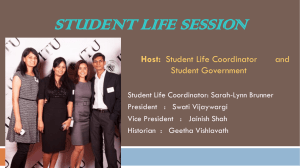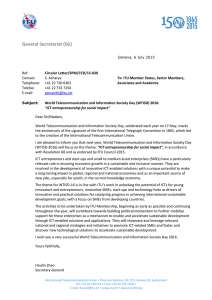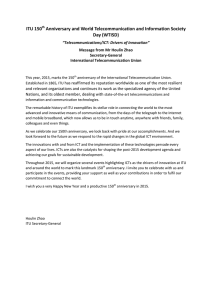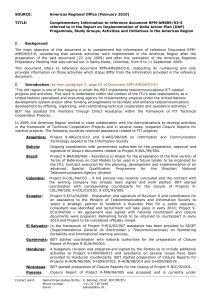ITU Regional Development Forum for the Americas 14 July 2015
advertisement
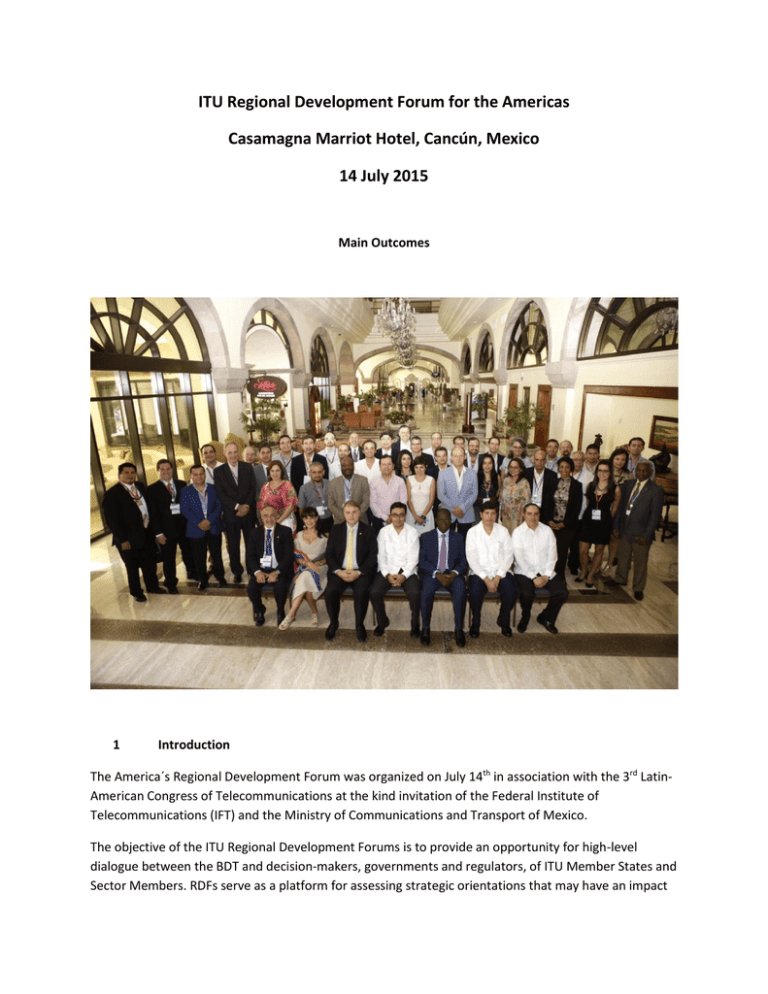
ITU Regional Development Forum for the Americas Casamagna Marriot Hotel, Cancún, Mexico 14 July 2015 Main Outcomes 1 Introduction The America´s Regional Development Forum was organized on July 14th in association with the 3rd LatinAmerican Congress of Telecommunications at the kind invitation of the Federal Institute of Telecommunications (IFT) and the Ministry of Communications and Transport of Mexico. The objective of the ITU Regional Development Forums is to provide an opportunity for high-level dialogue between the BDT and decision-makers, governments and regulators, of ITU Member States and Sector Members. RDFs serve as a platform for assessing strategic orientations that may have an impact on BDT's regional work plan in between world telecommunication development conferences. In this context, these Forums aim at reporting on the activities of the Dubai Action Plan, with particular emphasis on regional initiatives in order to get feedback from membership to adjust BDT's work in the regions. 2 Participation The meeting was attended by 139 participants representing 16 Member States, 5 Sector members, 5 scientific or industrial organizations; 3 Regional and other International Organizations, 3 Regional Telecommunications Associations, 1 Regional Financial Development Institution, 13 Private Sector Entities and 2 Academia Members. The meeting was attended by delegates of global players like Google, AT&T, Apple, Huawei, Cisco, Qualcomm, as well as entities like Internet Society and GSMA. The list of participants is attached. 3 Opening Ceremony In the Opening Ceremony Mr Brahima Sanou, Director of ITU’s Telecommunication Development Bureau noted that, “the Regional Development Forums are not only part of efforts to strengthen the ITU Regional presence, but also an occasion to extend the conversation on development issues to the telecom/ICT multi-stakeholders who are not yet Members of ITU Development sector. He said, “The Regional Initiatives for the Americas confirm that the region continues to give priority to topics that present recurring challenges. As we work together to build an inclusive information society, I invite you to share with us your views, suggestions, ideas and feedback on the initiatives.” “An inclusive information society means better education, improved access to medicine and health care, greater transparency and efficiency in governance and more equitable access to jobs and resources on markets that are globalizing rapidly, among many other opportunities,” he added. Mr Andrés de la Cruz, General Director of Telecommunications and Broadcasting Policies at the Undersecretary of Communications, observed that, “attaining universal ICT accessibility is a priority for the region as a means to promote development in underserved and remote areas and also empower vulnerable society groups.” He added, “The Regional Initiatives together with dynamic ICT policy and regulatory frameworks already in place provide a foundation to accomplish the inclusion of every person in the Information Society.” Mr Gabriel Oswaldo Contreras Saldivar President of IFT highlighted the implementation of major infrastructure projects which he said have led to a rapid expansion of the telecoms/ICT sector in the region. He however noted that the digital divide remains a major challenge for the region and called on participants at the forum, “to develop shared visions that will enable ICTs become a real tool for development in the Americas.” 4 Sessions The Forum discussed in detail the five Americas Regional Initiatives approved by the World Telecommunication Development Conference 2014 and provided members with an opportunity to exchange experiences and best practices in the implementation of the initiatives in the framework of the ITU Strategic Plan for 2016‐2019. Both the implementation of activities in the period 2010-2014 and the implementation plan for 2014-2018 were introduced by the Regional Director, Mr Bruno Ramos, in Session 1 of the Forum. The Initiatives focus on the following areas: emergency telecommunications; spectrum management and transition to digital broadcasting; development of broadband access; reduction of telecommunications services and Internet access costs and capacity building with special emphasis on cybersecurity and Internet governance. In Session 2 four ITU-D members (FCC, ANATEL, Intelsat, Ericsson) discussed the work done by ITU Development Sector in the Region last years as well as development activities implemented by themselves. On their views, the ITU has been very supportive of ICT development in the Americas both through its regional presence and work performed at the ITU-D Sector.It was mentioned there is extensive cooperation between the private sector, regional regulatory organizations, regulators and the ITU that can be leveraged in support of the regional initiatives. One such example is the on-going cooperation between the ITU, private sector and governments on a project to provide connectivity in the Pacific Islands region. In Session 3 CAF, GSMA LA, OSIPTEL Peru, ASIET and ISOC LA participated in a panel that discussed resources mobilization. Mauricio Agudelo, CAF representative informed that they are working in four fronts: Support regulatory frameworks, digital economy, infrastructure, and human resources. They see resource mobilization opportunities with content providers, in transport infrastructure and access networks, as well as provision of services, devices and terminals to the end user Sebastian Cabello, Director of GSMA LA, said that to be effective on resource mobilization you have to think globally and act locally. He listed some areas where they are working like Child Online Protection, mobile phones thefts, and capacity building. Sebastian highlighted the importance leaving aside selfishness at the time of cooperating to attend social needs. Cooperation should include all parties including especially those that are competing for the same markets. Luis Pacheco Zevallo from OSIPTEL informed on how this entity has been performing activities in relation with the topics included in the five Regional Initiatives. He made clear that there is still a lot of room for cooperation with the ITU and all stakeholders in terms of ICT development for countries like Peru. Juan Jung, ASIET representative, highlighted the need to promote more Public Private Dialogue as well as granting regulatory frameworks reliable and transparent. Juan underlined the importance to have efficient bureaucracies at the Regulators and to avoid taxes policies that prevent investments. Finally, Sebastian Bellagamba, ISOC LA mentioned three areas, among others, where they are working in the region: IXPs deployment, training and Internet Governance. This last topic, he said, concerns all parties attending the Forum since all of them are stakeholders in the Internet. Some suggestions were shared on how to improve ITU relevancy in the region. Its role as forum allowing dialogue between all interested parties was stressed, as well as its training capacity. It was mentioned that ITU should be more involved in regional processes like UNASUR, MERCOSUR, etc. and to avoid duplicating efforts. In Session 4 the approach was to discuss actions to achieve results in the framework of Regional Initiatives. A panel was integrated by Clovis Baptista, Executive Secretary of CITEL; Nigel Cassimire, CTU representative; Jorge Torres, Assistant Secretary of COMTELCA; and Alejandro Navarrete of IFT, Mexico. A big consensus was shared on the relevance of the ITU as a medium to gather parties to cooperate on ICT development. All the participants also considered there is a lot of room to increase collaboration and identified the ITU as the appropriate forum where such collaboration can be improved. 5 Closing ceremony and follow up At the Closing Ceremony, BDT Director said he was taking with him some strong messages coming out of the Forum. The main one being the need to cooperate more efficiently with Americas Membership, regional organizations and regional processes to avoid stressing resources by duplicating efforts. Mr Sanou also thanked the participants for their contributions to the implementation of the Americas regional initiatives, and specially the IFT and Secretary of Communications of Mexico for inviting and warmly hosting the RDF in Cancún.


